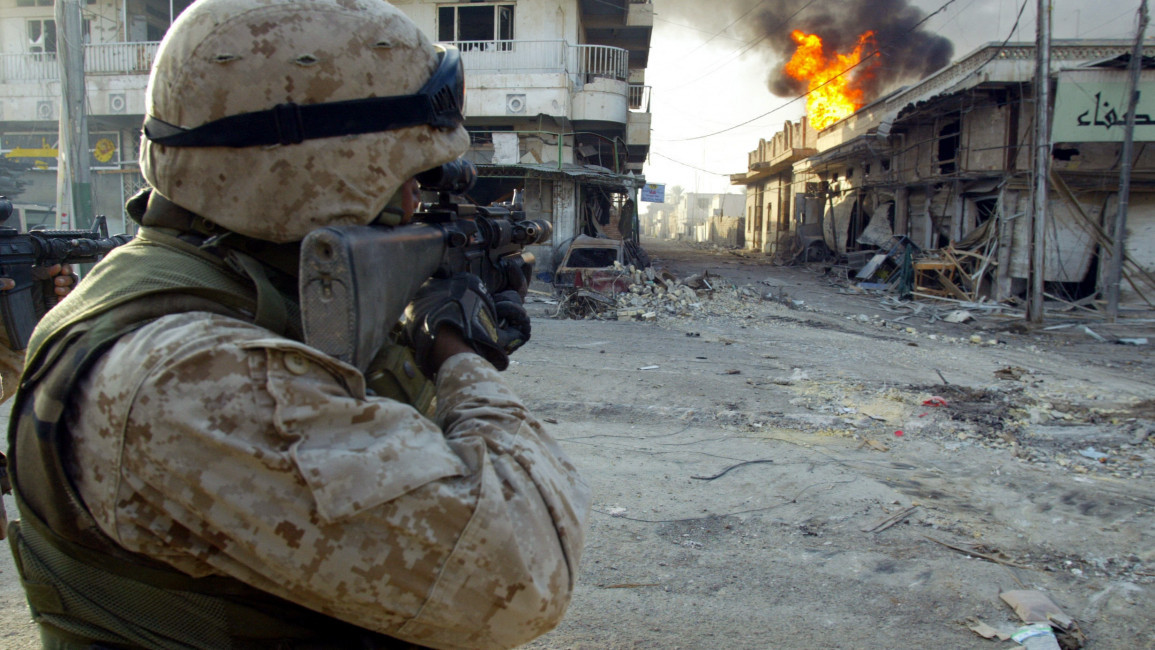Twenty years on, Iraqis hopelessly commemorate the US-led invasion and occupation of Iraq
Twenty years after the launch of the US-led invasion of Iraq on 20 March 2003, Iraqis who spoke to The New Arab say those who replaced Saddam Hussein's regime failed to achieve promises to provide a decent life for the public.
On Monday, Iraqis and others remembered the bitter legacy of the illegal invasion and occupation of the country by the United States, the United Kingdom and others, the repercussions of which are still felt today.
"In the past and for now, we think the toppling of Saddam Hussein’s regime was a necessity otherwise it might have committed many other crimes like attacking Halabja with chemical weapons and other crimes against the peoples of Iraq," Kamil Abdulqadir, a survivor from the gas-attack and spokesperson of the Association for Victims of Halabja Chemical Attack told TNA over the phone from Germany, where he still receives treatment due to inhaling the poisonous gasses.
On 16 March 1988, Saddam's regime attacked Halabja city, killing more than five thousand people and wounding tens of thousands.
"However, we had never anticipated that successors of the dictatorship regime would only pay attention to their own interests and the interests of their ruling families," Abdulqadir grimly remarked.
20 years ago, Tony Blair said: “History will be my judge”
— Stefan Simanowitz (@StefSimanowitz) March 19, 2023
Now, as we mark #Iraq20YearsOn, we can judge for ourselves
I’m afraid, Tony, doesn’t look good
This thread reveals the grand deceit that took us to war
Ex IAEA head, @ElBaradei calls it an “indispensable read”#IraqWar https://t.co/bggdqglLlu pic.twitter.com/L1zAhM5Ng4
"Frankly speaking, the lives of the Iraqis are very miserable. We as people of Halabja were hoping that our city would become a model in progress and survivors of the massacre would be treated in the most modern hospitals, but alas all those were dreams that never came true," he added.
The devastating consequences of the invasion still haunt almost all Iraqis, regardless of their ethnicity, religion or political alignment.
"Iraq has passed through difficult times and several wars, the Iraq-Iran war, the invasion of Kuwait, and then the US forces in alliance with 30 countries have invaded Iraq," said Hassan, an Arabic language teacher from the volatile Diyala province, northeast of the country, in Sulaimaniyah city.
Fearing reprisals by Iraqi militias loitering in his birthplace and accused of being behind recent mass killings, Hassan did not want to share his family name. "The occupation leads to catastrophe and wars are always devastating," he said, "Iraq has paid a lot of martyrs, our cities and towns were destroyed and finally the former regime collapsed. We had hopes that after the 2003 invasion, Iraq might experience a new renaissance after the so-called liberators deluded us with democracy, but the reality is that there is no democracy in this country."
He also said that the fall of Baghdad in 2003 led to the collapse of "great Iraq", considered the eastern gate of a pan-Arab homeland.
"The colonialists always seek an excuse to enter a country. In the case of Iraq, they claimed that they would bring democracy and development to the country but we noticed contradictory conditions on the ground throughout the past 20 years," he added. "The invaders, the Iraqi ruling elites and the neighbouring counties divided Iraq as a spoil of war, the one who paid the price is the Iraqi people."
Political observers are also pessimistic about Iraq's current state and its future.
"Today Iraq is enjoying its most stable period since 2003. However, it remains fragile and divided, and its people face an array of deepening challenges, from lack of economic opportunities to access to vital municipal services, which the state is struggling to provide," Shivan Fazil, a researcher with the Middle East and North Africa program at Stockholm International Peace Research Institute (SIPRI), told TNA.
Answering whether Iraq can be described as a "flourishing democracy", Fazil said, "Far from it. Since the resumption of parliamentary democracy in 2005, there has been a continuous and steady decline in election turnouts; a clear indication that large segments of the population do not feel represented by the current system of governance and have lost trust in the political processes and bringing about change in the status quo through conventional forms of politics."
Mohammed ElBaradei, the director general for the International Atomic Energy Agency (IAEA) during the time of the Iraq war, was one of many officials who had attempted to stop the assault planned by former US president George W. Bush and former UK prime minister Tony Blair in 2003.
The US and UK had claimed that Iraqi dictator Saddam Hussein was hiding weapons of mass destruction (WMDs) and gave an ultimatum to his regime to hand over the alleged chemical stockpiles; not long after, it was proven that WMDs did not exist.
Despite the best efforts by ElBaradei and others to stall the military action, the invasion went ahead on 20 March 2003 with more than one million people killed as a result.



